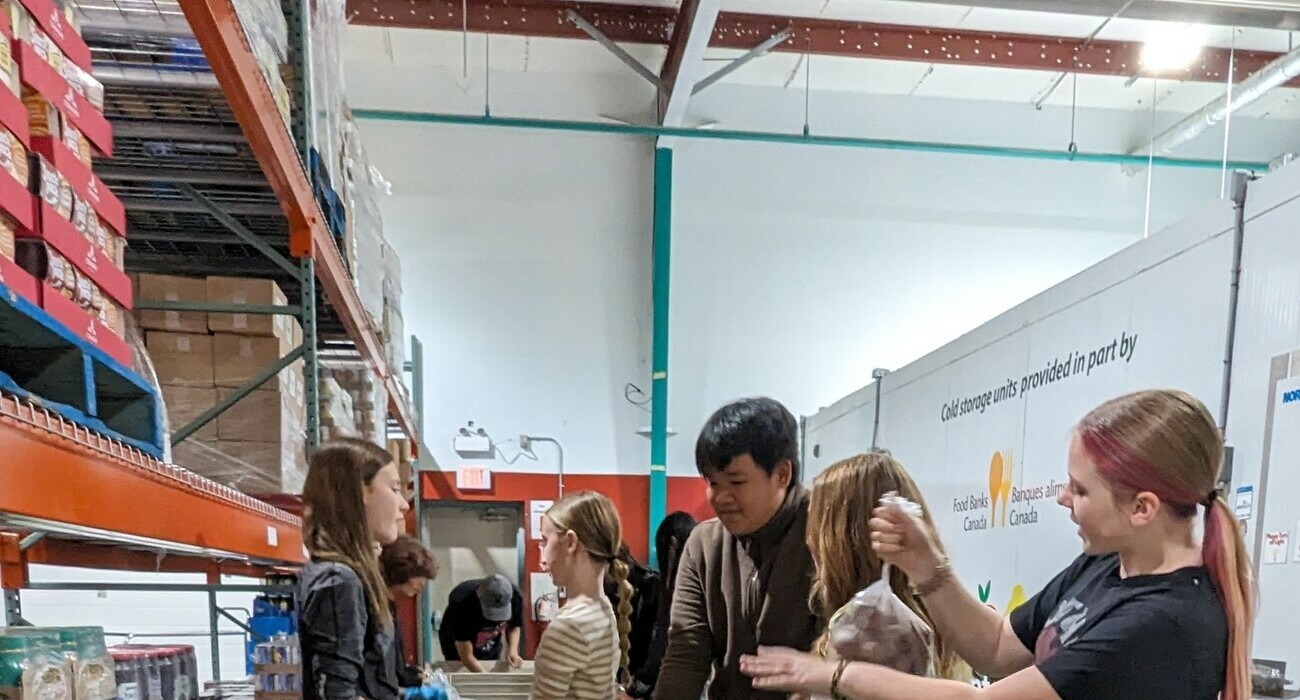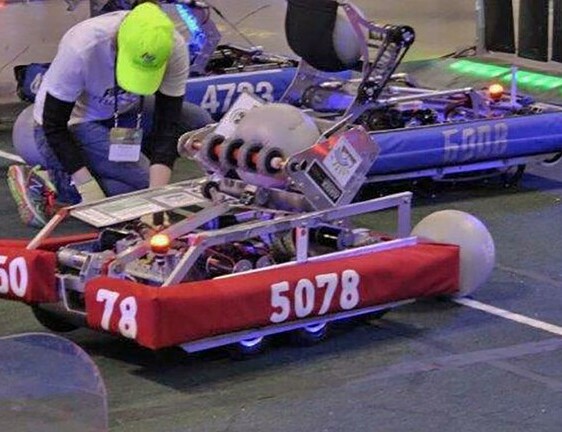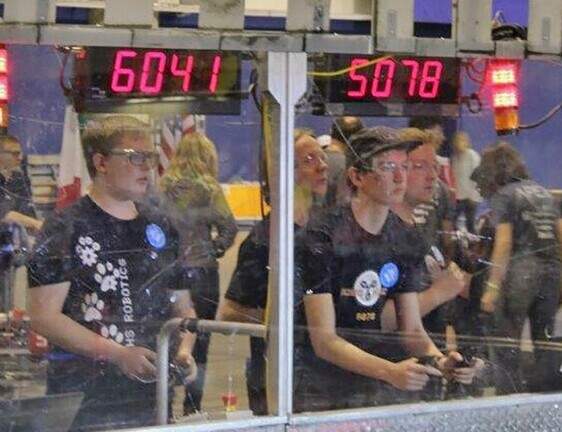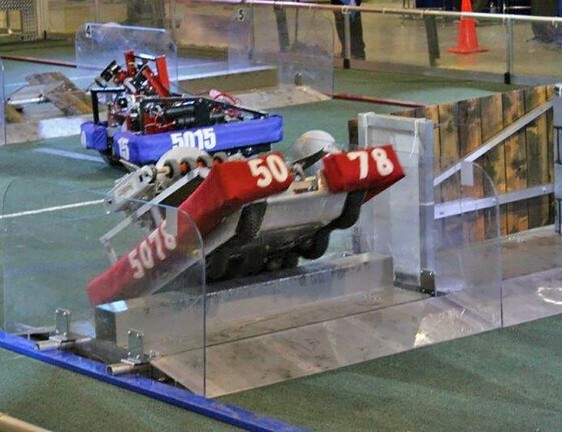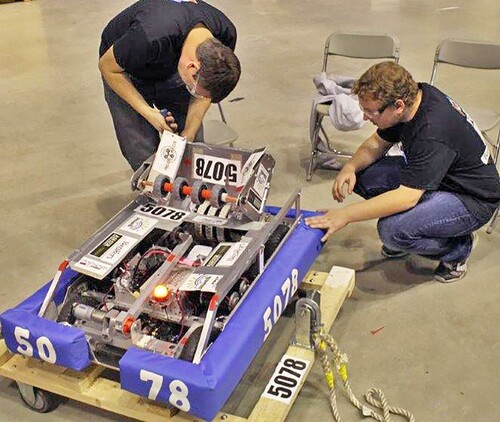
Robotics is the name of the game, but Calgary Christian Secondary School students are coming away with skills that far outweigh the mechanics involved.
Team Robo-Kaos recently took part in the Western Canada FIRST Robotics Regional Competition in Calgary. The event saw almost three dozen teams of high school students from around the world build and program a robot they took into three days of intensive, head-to-head competition.
The team of 10 Calgary Christian students placed an impressive eighth through the qualification rounds, its best-ever showing in three years of competition. The rankings are based on completing very specific tasks in a medieval-type battle, but the lessons learned are much broader in scope.
“You learn to work as a team and you learn to use skills you learned in school, like math and science skills,” said Chris Deren, captain of Team Robo-Kaos.
The fact the student-competitors are able to test their knowledge and skills in a practical manner and aren’t just reading about it in a book can’t be emphasized enough.
“It’s real-world stuff and when your chain breaks in the middle of the competition, you need to think on your feet and not get upset about it,” added Hendria Nielsen, a parent and team mentor. “And you have to work as a team and under pressure – which can bring its own dynamics along – so it’s a really good experience for the kids.”
Deren has been with the Calgary Christian robotics team since it began and said their “quality of design and quality of critical thinking have improved drastically” over that span.
“The first year our robot was barely functional. The next year it had some major quirks, and this year was fantastic,” said the Grade 12 student, adding he’s confident next year’s team will learn from this year and strive to place even higher.
The push for a robotics team was sparked after Kevin Sieswerda, then in Grade 9, was invited to join another Calgary school in the Western Canada regionals. He “caught the bug” and began the process of starting a team at Calgary Christian with his father, John, eventually taking the role of lead mentor.
Some school teams are spearheaded by a teacher who is particularly passionate about robotics. The driving force at Calgary Christian has been a half-dozen mentors, primarily parents including some with engineering backgrounds like Nielsen and John, as well as alumni now working in the field.
Principal Jason Kupery said their interest and involvement is not lost on the school.
“I think the biggest thing is the idea of community and how it feeds into our school goals and builds into the fabric of mentorship,” he said. “We have older kids in our school mentoring younger kids and getting them excited about robotics and we also have former students, alumni, who come back and lend a hand.”
While there are robotics competitions scheduled throughout the year, especially in eastern Canada and the U.S., the regional event has been the sole focus of Team Robo-Kaos as the cost can be prohibitive. The fee, including the cost of the robot kit all entrants receive, is $8,700 and the team had to fundraise to cover that amount.
This year’s competition provided an additional twist and a new learning opportunity as the team’s top-eight finish in the qualifying rounds allowed them to be part of the process in picking teams of three for the final challenge. The team’s 11 matches earlier also saw schools compete in teams of three, but the squads were combined at random each time.
A lot of strategy, and scouting of the other schools, is involved in deciding who best to team up with to storm and capture the castle tower of the opposing alliance in the final challenge.
“You have to understand what other teams can do and those who are complimentary to whatever the strengths of your robot are,” said John. “In an ideal world, you want to select an alliance mate that brings something into the team that you don’t have.”
Unfortunately, the Team Robo-Kaos entry experienced mechanical problems early in the final challenge and despite its best efforts to fix the robot the alliance had to press on with just two team members.
Both John and Nielsen were impressed that the team didn’t give up and continued with their problem solving efforts. Deren was just glad their teammates, including one high profile school, were very supportive despite Calgary Christian’s mechanical failure.
Kupery said the robotics competition proves the value of learning through error.
“One of the things we are trying to create in our culture is that it’s OK to fail because when you fail it presents an amazing opportunity to learn something,” he said.
The competition offered students a chance to meet and interact with students in Grades 9 to 12 from across Canada, the U.S., Mexico, Israel and Australia. It’s also an opportunity to decide whether they might want to be involved in robotics or related fields beyond high school.
John’s son Kevin is in his first year of chemical engineering technology at the Southern Alberta Institute of Technology, while Deren has been accepted to the engineering program at the University of Victoria next year.
“It definitely helped me confirm some of the things I wanted to do,” said the 18-year-old, of the robotics competition. “Time spent problem-solving on the robot involved lots of engineering concepts you had to figure out and solve. I figured out ‘hey, this is something I can do, and it’s fun.’ ”
Both Deren and the two mentors said they would encourage others in Palliser Regional Schools to consider involvement in the FIRST robotics competitions given its many benefits to the students. For more information on Calgary Christian Secondary’s robotics team, go to www.robo-kaos.com.
For information on the FIRST robotic competitions, go to www.firstinspires.org
Meanwhile, another Palliser school out of Calgary, Master’s College, recently took part in the 2016 VEX World Robotics competition in Kentucky.

